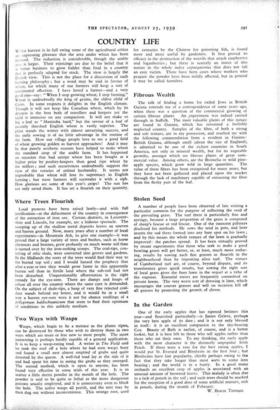Where Trees Flourish
Loud protests have been raised lately—and with full justification—at the defacement of the country in consequence of the extraction of iron ore. Certain districts, in Leicester- shire and Lincoln, for example, are a hideous spectacle. The scooping up of the shallow metal deposits leaves an uneven and barren ground. Now, many years after a number of local experiments—in Mountain Ash, to give one example—it was proved that a large variety of trees and bushes, such as horse chestnuts and brooms, grew profusely on much worse soil than is turned over by the iron-seeking scoops. The coal-tips, con- sisting of relic shale, were converted into groves and gardens. In the Midlands the roots of the trees would find their way to the buried top soil ; and I would hazard the prophecy that after a year or two they would grow faster in this apparently barren soil than in fertile land where the sub-soil had not been disturbed. Unquestionably afforestation is the right remedy for the eye-sore. There are dumps and heaps of refuse all over the country where the same cure is demanded. On the subject of shale-tips, a heap of very fine rejected coal- dust stands behind my house, and it would be in a small way a barren eye-sore were it not for chance seedlings of a polygonum baldschuanicum that seem to find their optimum of conditions in this unlikely medium.








































 Previous page
Previous page